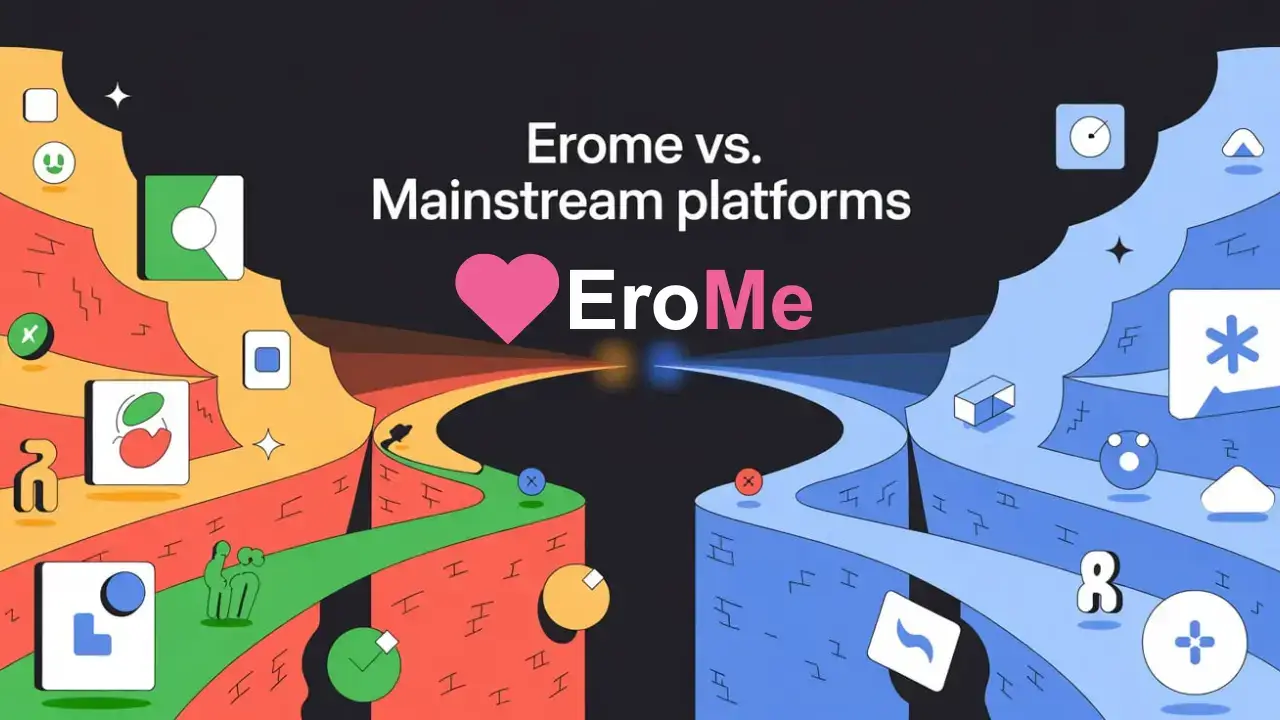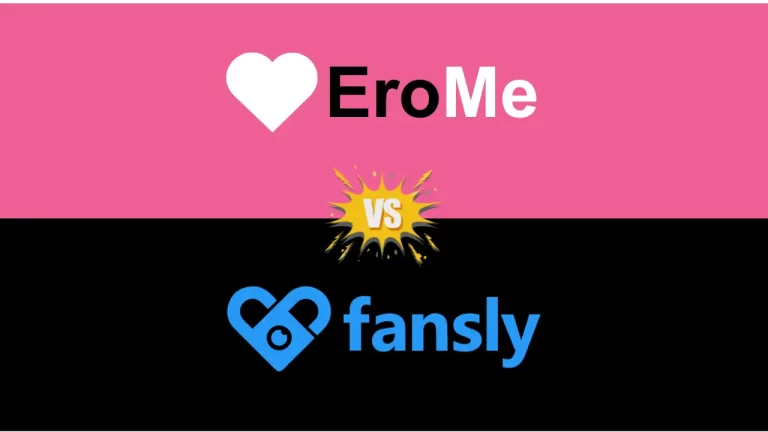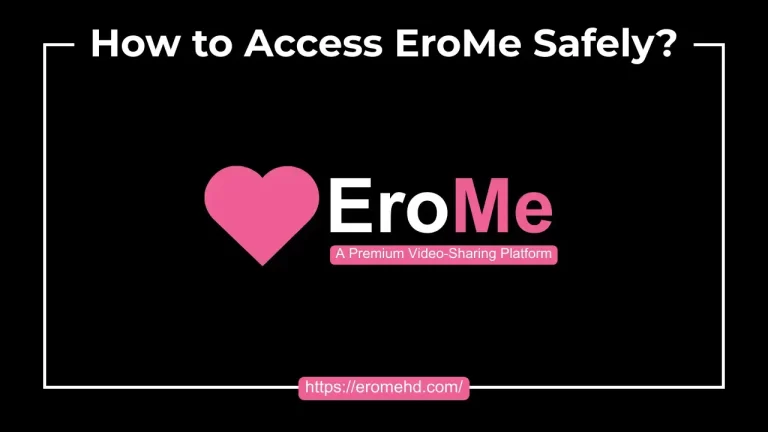Erome vs. Mainstream Platforms: Which Platform Suits You Best?
Ever wondered how platforms like Erome stack up against the giants like Instagram, TikTok, or YouTube? You’re not alone. In this digital age, content creators and viewers alike are constantly comparing where to upload, share, or consume content. This article dives deep into the debate of Erome vs. Mainstream Platforms, uncovering the key differences that matter to users, creators, and even casual browsers.
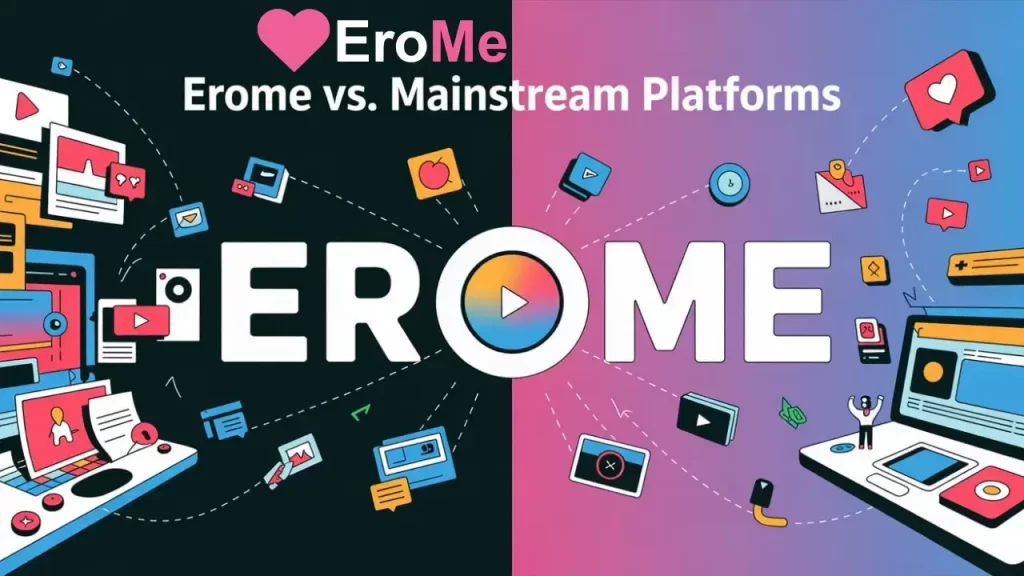
Understanding Erome
Erome isn’t your average social media platform—it plays in a niche space that gives creators total freedom over what they share. Known for its relaxed content policies, it’s especially popular among adult content creators who feel restricted by mainstream rules.
What Is Erome?
Erome is a user-driven content sharing platform that focuses heavily on freedom of expression. Unlike traditional social media, it allows NSFW (Not Safe For Work) and adult-oriented uploads without censorship. The platform is clean, simple, and straight to the point—no algorithm drama or tight moderation.
Who Uses Erome?
Erome attracts a specific kind of audience—mostly adult content creators, independent performers, and fans who enjoy uncensored material. It’s also a haven for those who are tired of being flagged or banned on mainstream sites due to strict content policies. Creators here often feel more in control of their content and audience.
What Makes Erome Different?
The biggest draw? Creative freedom. Erome.com gives you the power to post what you want, how you want, without worrying about community guidelines or takedowns. It’s also not ad-heavy, meaning fewer distractions and a more direct creator-viewer connection.
Read More: EroMe vs Fansly
Overview of Mainstream Platforms
Examples of Mainstream Platforms?
When we say “mainstream platforms,” think Instagram, TikTok, Facebook, YouTube, and Twitter (now X). These platforms dominate the digital landscape and are often the go-to places for everything from memes to music videos to lifestyle vlogs.
What They Offer to Users?
These platforms are polished, feature-rich, and built for mass consumption. They offer tools for video editing, live streaming, commenting, reacting, and more—all designed to boost engagement and keep users scrolling. Think convenience and community in one place.
Audience Reach and Trust Level
Mainstream platforms have billions of users globally. They’ve built trust over the years and are often considered the “safe choice” for content creators looking to go viral or build a professional brand. Their algorithms push content far and wide—sometimes too far.
Content Freedom and Control
Erome operates with a much looser grip when it comes to content rules. It allows creators to upload explicit or adult content freely, giving them total control over what they share. There’s no shadow-banning, and takedowns are rare unless the content is illegal or violates basic ethics. For creators who’ve faced constant content strikes on other sites, Erome is a breath of fresh air.
On the flip side, mainstream platforms come with tight community guidelines. Anything that’s even slightly controversial risks being flagged or removed. While this helps maintain a “family-friendly” image, it often frustrates users who feel restricted. The pros? Mainstream sites are cleaner, more advertiser-friendly, and widely accepted. The cons? Creators have limited control and often walk a tightrope between creativity and compliance.
Privacy and Anonymity
Erome’s Take on Privacy
Erome prioritizes privacy, allowing creators to post content without revealing personal information if they choose not to. The platform doesn’t force creators to share their identities or connect their accounts to any other social networks. This anonymity is a key selling point, especially for those in more niche or adult spaces, where privacy is critical.
How Mainstream Platforms Handle User Data
Mainstream platforms, on the other hand, collect a significant amount of user data to serve personalized ads, track engagement, and optimize content delivery. This can make users feel exposed, as their activities are constantly monitored. Even creators are often subject to this data mining, which can affect how their content is showcased and monetized.
What It Means for Creators and Viewers
For creators, Erome’s commitment to privacy allows them to express themselves without fear of personal exposure. However, mainstream platforms, with their data-centric models, offer more visibility and opportunities for brand partnerships. The trade-off? Creators must give up a certain level of privacy for broader exposure, while viewers may feel their actions are constantly under scrutiny.

Monetization Opportunities
Can You Make Money on Erome?
Yes, Erome offers monetization options for creators, primarily through paid subscriptions, donations, and direct support from viewers. It’s a straightforward model that cuts out the middleman, allowing creators to earn money from their content without being beholden to advertisers or complex algorithms. It’s a more direct way to generate income from your audience.
Earning on Mainstream Platforms
Mainstream platforms also offer monetization, but with stricter rules. On YouTube, for instance, creators must meet specific criteria (such as subscriber count and watch hours) to start earning from ads. Platforms like Instagram or TikTok focus more on brand partnerships, sponsored content, or affiliate marketing, which can be lucrative but often harder to break into.
What’s More Creator-Friendly?
In terms of ease and control, Erome is far more creator-friendly. You’re in charge of your earnings, and the platform doesn’t impose strict rules about monetization. In contrast, mainstream platforms offer more earning potential in terms of ad revenue but often come with complex guidelines, restrictions, and competition for exposure.
Read More: EroMe vs OnlyFans
Community and Engagement
Erome’s Community Vibe
Erome’s community is small but tightly-knit, largely consisting of users who appreciate the freedom of expression the platform offers. Engagement is more personal, with creators directly interacting with their fans through messages, custom content, and private channels. There’s a strong sense of support and understanding in this niche environment.
Interactions on Mainstream Platforms
Mainstream platforms boast massive communities, but the interaction can feel impersonal at times. While comments, likes, and shares fuel the engagement, creators often struggle to form genuine connections in such a crowded space. Fans may feel lost in the shuffle of thousands of other accounts and content pieces.
Which Is More Supportive?
Erome’s smaller, more dedicated community often results in a more supportive environment, where creators and viewers share mutual respect and understanding. Mainstream platforms, while offering a broader audience, can sometimes feel more like a popularity contest, with creators needing to conform to trends and algorithms to be noticed.
Content Moderation and Safety
EroMe moderates content with a light touch, focusing on removing illegal material rather than imposing heavy restrictions on content creators. The platform prioritizes creator autonomy, allowing them to share more freely than on mainstream sites. However, safety can be a concern, as there is less oversight compared to major platforms.
Mainstream platforms enforce strict content moderation, using algorithms and human moderators to ensure adherence to community guidelines. While this prevents harmful or offensive material, it often leads to over-censorship. For users, safety measures like reporting features and content filters are common, but they still vary in effectiveness across both types of platforms.
Design, Usability & Experience
Erome offers a clean, simple interface with minimal distractions, which allows creators to focus on content and community interaction. Its design is easy to navigate, without overwhelming users with unnecessary features. The platform’s emphasis on usability means that even newcomers can figure out how to upload and share content quickly. However, some might find the layout a bit too basic, lacking the bells and whistles of more sophisticated platforms.
Mainstream giants like YouTube, Instagram, and TikTok provide sleek, polished interfaces with a plethora of interactive features, but they can also feel a bit cluttered. The sheer volume of options and features can be overwhelming for users, especially those just starting out. While these platforms may provide a more complex experience, they also offer highly integrated tools that help creators edit, promote, and engage their audience.
Which One’s More User-Friendly?
When it comes to pure user-friendliness, Erome’s simplicity gives it an edge for those who prefer straightforward navigation. Mainstream platforms, though feature-rich, can sometimes complicate the user experience due to their packed interfaces and constant changes to algorithms and tools.
Algorithm and Discoverability
On Erome, content spreads organically through the platform, often driven by personal interactions and niche communities rather than algorithmic pushes. The discoverability process feels more authentic, as viewers can find content through tags, direct recommendations, and word-of-mouth. This gives smaller creators a chance to grow at a more natural pace.
Mainstream platforms use complex algorithms that prioritize engagement metrics like views, likes, shares, and comments to push content to a wider audience. While this can boost visibility for popular creators, it often buries smaller or newer content, making it harder for new voices to break through without the backing of a viral moment or strategic marketing.
Which Offers Better Visibility?
Mainstream platforms win when it comes to sheer visibility, thanks to their sophisticated algorithms that amplify content. However, this creates a competitive environment where only the most engaging or trendy content gets noticed. Erome, in contrast, offers a more grassroots approach to discoverability, where creators can rise on their own merit and personal connections.
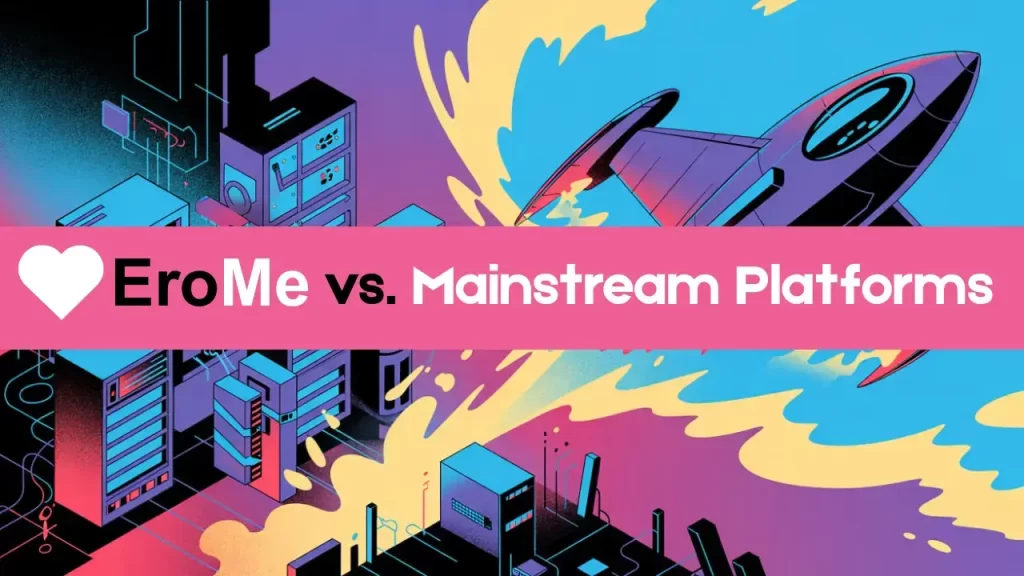
Legal and Ethical Considerations
Is Erome Operating Within Legal Boundaries?
Erome operates within legal boundaries by strictly prohibiting illegal content, including child exploitation or any other material that violates international law. However, its lenient content policy means that there is a gray area when it comes to certain adult material, which might not always align with local laws in some regions. Creators are encouraged to ensure their content complies with the platform’s guidelines to avoid legal complications.
Mainstream Platforms and Compliance
Mainstream platforms like YouTube, Facebook, and Instagram follow rigorous compliance protocols to ensure they meet international laws and regulations. They enforce policies to prevent the spread of harmful or illegal content, including hate speech, misinformation, and graphic violence. These platforms are often under the microscope of government bodies, which makes them cautious about complying with ever-changing regulations.
How Ethical Are These Spaces?
Ethically, both types of platforms face challenges. Erome is more transparent with its content policies, giving creators more freedom but sometimes enabling content that could be seen as controversial. Mainstream platforms, while adhering to ethical guidelines, often come under fire for their handling of user data, censorship issues, and content moderation practices. Both platforms have their flaws, but the ethics of their operation depend largely on their approach to freedom versus regulation.
Censorship and Freedom of Expression
Erome’s Anti-Censorship Stance
Erome prides itself on being an anti-censorship platform, offering creators the freedom to share content without fearing bans or takedowns for nudity, adult content, or other controversial subjects. This open stance attracts those looking for a space where they can express themselves without the typical restrictions of mainstream platforms. The platform’s loose moderation rules empower users to post freely, as long as they avoid illegal content.
Mainstream Rules and Bans
In contrast, mainstream platforms enforce strict community guidelines that often lead to content removals or account suspensions for nudity, controversial opinions, or anything deemed “inappropriate.” These rules are designed to maintain a broad audience base, making them more family-friendly. However, this can stifle free expression, especially for creators who push the boundaries of typical content.
Striking a Balance
Striking a balance between freedom and responsibility is tough for any platform. Erome’s anti-censorship stance gives creators the freedom they crave but can sometimes lead to more controversial content. On the other hand, mainstream platforms prioritize safety and inclusivity, but their strict rules can limit creativity and stifle personal expression.
Read More: Is EroMe Safe?
Which One Should You Choose?
When deciding between Erome and mainstream platforms, it ultimately depends on your goals. If you’re looking for freedom of expression without worrying about being flagged or banned, Erome is a great choice. If your purpose is to reach a wider audience, build a professional brand, or engage in monetization through ad revenue, mainstream platforms offer greater visibility. Audience matters, too—mainstream platforms cater to larger, more diverse audiences, while Erome focuses on niche communities that value uncensored content.
Conclusion of Erome vs. Mainstream
In the battle of Erome vs. Mainstream Platforms, there’s no one-size-fits-all answer. Both options have their unique advantages and challenges. Whether you’re drawn to Erome’s open freedom or the polished, far-reaching platforms like YouTube and Instagram, it’s all about aligning your content goals with the right platform. Choose wisely based on your needs, whether it’s creative freedom, community, or visibility.

